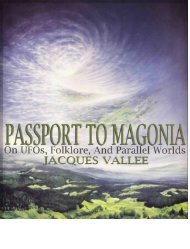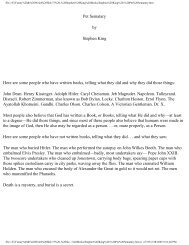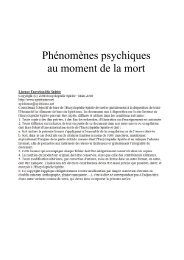extraordinary%20encounters
extraordinary%20encounters
extraordinary%20encounters
Create successful ePaper yourself
Turn your PDF publications into a flip-book with our unique Google optimized e-Paper software.
Noah-I, was driven from Mars. With his creations,<br />
he flew back to Earth in a spaceship<br />
(Noah’s Ark) and populated the Earth.<br />
According to Trench, all human conflict<br />
stems from mankind’s dual nature. Only if we<br />
achieve “total consciousness”—in which both<br />
the superior Serpent heritage and the Animal<br />
nature are integrated—can we claim our place<br />
as wise, peaceful citizens of the galaxy.<br />
Further Reading<br />
Trench, Brinsley le Poer, 1960. The Sky People. London:<br />
Neville Spearman.<br />
Smead’s Martians<br />
A century ago pioneering psychical researcher<br />
James Hyslop investigated a case in which an<br />
American woman received psychic messages<br />
from Mars. The Martians, however, were not<br />
natives of the planet but deceased relatives<br />
who were now living on the Red Planet.<br />
The woman, whom Hyslop identifies only<br />
as Mrs. Smead, was married to a clergyman.<br />
All her life she had had psychic experiences,<br />
many of them involving spirit communications<br />
through automatic writing. Then in<br />
1895 a different set of messages started to<br />
come through. They were from her three dead<br />
children and her deceased brother-in-law.<br />
One of the daughters, Maude, provided a description<br />
of her new home, which she said was<br />
crisscrossed with canals, reflecting a belief to<br />
that effect (since conclusively debunked)<br />
promulgated by astronomer Percival Lowell.<br />
The communications ceased, then resumed<br />
again five years later as if there had been no<br />
interruption. Invited to assess them, Hyslop<br />
deduced that they came out of a “secondary<br />
personality”—what now would be called the<br />
unconscious mind—of Mrs. Smead’s. He<br />
wrote,<br />
We find in such cases evidence that we need<br />
not attribute fraud to the normal consciousness,<br />
and we discover automatic processes of<br />
mentation that may be equally acquitted of<br />
fraudulent intent; while we are also free from<br />
the obligation to accept the phenomena at<br />
Smith 233<br />
their assumed value. Their most extraordinary<br />
characteristic is the extent to which they imitate<br />
the organizing principle intelligence of a<br />
normal mind, and the perfection of their impersonation<br />
of spirits, always betraying their<br />
limitations, however, just at the point where we<br />
have the right to expect veridical testimony to<br />
their claims. (Hyslop, 1908)<br />
See Also: Aliens and the dead; Allingham’s Martian;<br />
Aurora Martian; Brown’s Martians; Dentons’s<br />
Martians and Venusians; Hopkins’s Martians;<br />
Khauga; Martian bees; Mince-Pie Martians;<br />
Monka; Muller’s Martians; Shaw’s Martians;<br />
Wilcox’s Martians<br />
Further Reading<br />
Hyslop, James H., 1908. Psychical Research and the<br />
Resurrection. London: Fisher Unwin.<br />
Smith<br />
During a wave of sightings of mysterious,<br />
never-explained “airships” (UFOs in modern<br />
terminology) in the spring of 1897, a Rockland,<br />
Texas, man named John Barclay claimed<br />
an encounter with a close-lipped pilot who<br />
gave only his last name. The Houston Daily<br />
Post of April 25 reported the incident.<br />
Around 11 P.M., as Barclay told the story,<br />
he heard his dogs barking frantically. Glancing<br />
out his window, he was startled to see an<br />
oblong-shaped object with wings circling just<br />
above his pasture. Moments later the ship<br />
landed. Winchester rifle in hand, the witness<br />
stepped outside where he spotted a stranger.<br />
The stranger identified himself only as<br />
“Smith.” He would not allow Barclay to get<br />
closer to the ship. “We cannot allow you to<br />
get any closer, but do as we request [and] your<br />
kindness will be appreciated,” Smith said,<br />
“and we will call on you some future day and<br />
reciprocate your kindness by taking you on a<br />
trip.” He handed Barclay ten dollars and<br />
asked him to purchase lubricating oil, two<br />
cold chisels, and bluestone from a nearby saw<br />
mill and railroad depot. On his return Barclay<br />
asked the aeronaut where he was from. “Anywhere,”<br />
Smith replied, then added, “We will<br />
be in Greece day after tomorrow.” He entered<br />
the ship and was gone.





